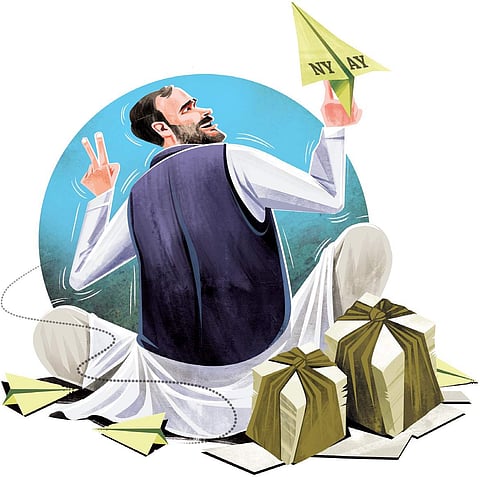

HYDERABAD: If it’s one thing that an election season cannot do without, it’s the grand promises of political parties. While the ruling BJP came to power in 2014 offering millions of jobs and greener pastures, this time around, it’s the Congress party that’s dangling the carrot. Its proposed minimum income guarantee scheme, Nyuntam Aay Yojana (NYAY), promises to transfer Rs 6,000 per month to at least 25 crore individuals, but it first needs an eye-popping Rs 3.6 lakh crore every year to punch the air.
While the jury is still out on whether the scheme will serve the intended purpose, the proposal is a tacit admission by the Congress party that cash transfers could hold the key to eliminate poverty. This is a significant departure from its earlier stance of sticking to the subsidy regime and putting faith only in-kind transfers until now.
Economists and policy watchers are divided about the prospects of the scheme. Speaking to The Morning Standard last month, the government’s Chief Economic Adviser, Krishnamurthy Subramanian, stressed that any monthly income guarantee scheme was a bad idea. “There’s no way of verifying the income of beneficiaries,” he reasoned.
Others point to the pilot study in a village in Madhya Pradesh, where residents were given basic income, or to the success of Telangana’s Rythu Bandhu scheme, which entailed cash transfers to farmers chosen with zero criterion.
Those favouring the scheme insist that unconditional income transfers provide income security and liquidity to the poor. But will such an income guarantee scheme reduce poverty? There are no easy answers.
Despite economic growth averaging 7 per cent in the past decade, inequality continued to rise, which is why analysts stress on the need for job creation. Others also assert that poverty results not from earnings deficit alone, and hence, continuity in access to quality education, healthcare and other social services is highly essential.
“Going by 2011-12 expenditure survey, even assuming that incomes of poorest households rose as fast as national average, 40 per cent rural and 10 per cent urban families remained below Rs 12,000 per month in 2018-19. So NYAY will not bring all families above Rs 12,000,” economist Arvind Panagariya said in a tweet last week.
Above all, if NYAY is implemented, it could put pressure on our finances, particularly amid the lackluster show put up by both direct and indirect tax collections. Increasing taxes to raise revenue may draw the ire of taxpayers, but in the absence of new revenue-raising measures, the implementation of the scheme could be potentially affected much before its pan-India rollout.
Change of Stance
The proposal is a tacit admission by the Congress party that cash transfers could hold the key to eliminate poverty. This is a significant departure from its earlier stance of sticking to the subsidy regime